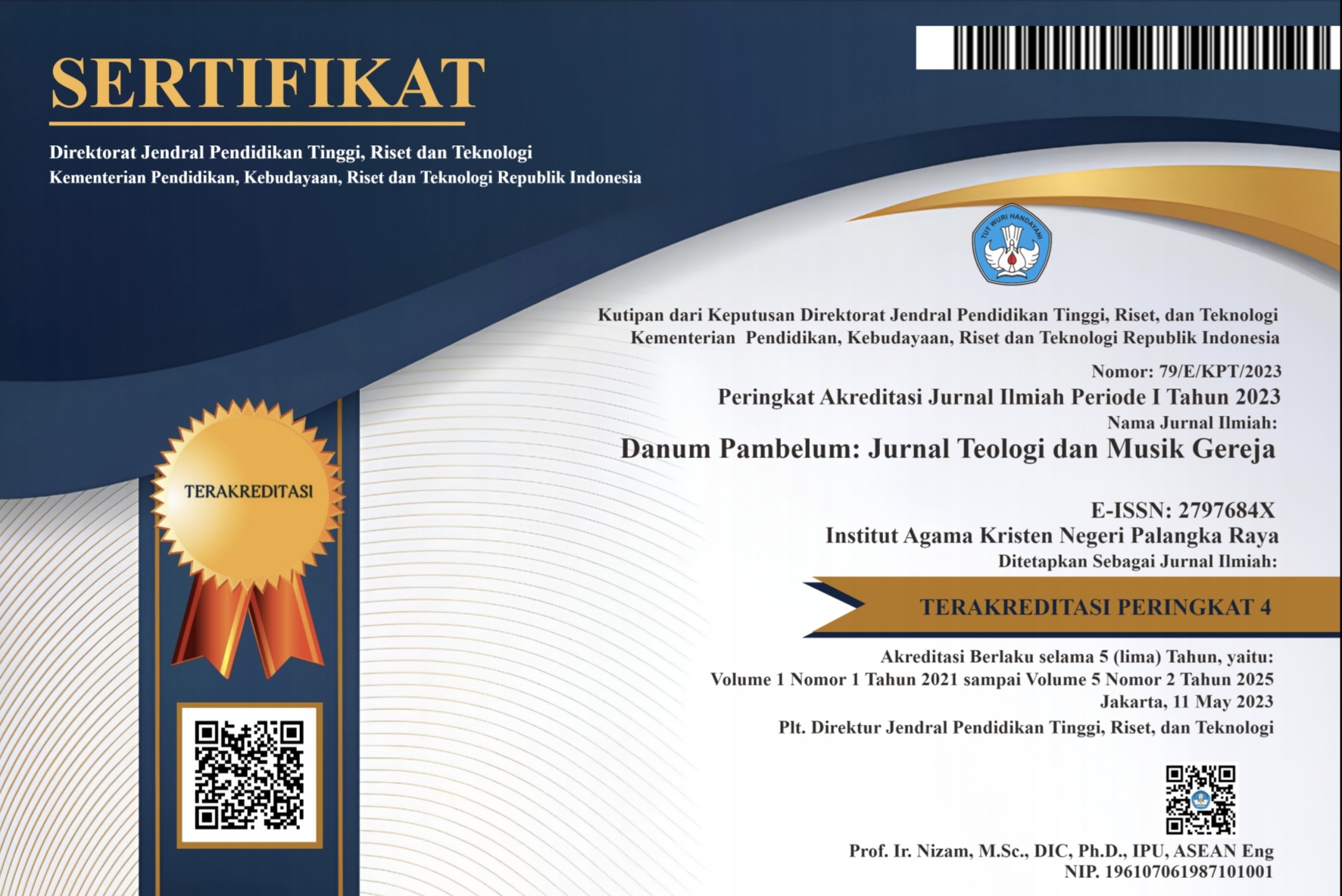Teologi Terjun Bebas: Bahaya Tafsir Alkitab Tanpa Konteks
DOI:
https://doi.org/10.54170/dp.v5i1.837Keywords:
Theology, Free Fall, Biblical Interpretation, Danger, HermeneuticsAbstract
The phenomenon of interpreting the Bible without context is increasingly prevalent in the digital era, creating serious dangers for correct theological understanding. This problem is characterized by the congregation's lack of understanding of hermeneutical principles, the influence of individualism, and the impact of social media algorithms that accelerate the spread of erroneous interpretations. This study aims to identify the causes, impacts, and solutions to this phenomenon. The method used is a qualitative-descriptive approach with literature analysis such as theological books, the Bible and scientific journals. The results of the study indicate that the inability to understand the historical-grammatical context, neglect of church tradition, and low awareness of the theological unity of the Bible are the main root problems. This phenomenon contributes to the emergence of deviant teachings, a crisis of authority in interpreting the Bible, and divisions in the church community. The discussion highlights the importance of developing a hermeneutics curriculum, using digital media wisely, and forming a healthy Bible study community. Based on the formulated title, it shows that the dangers of interpreting without context can be minimized through systematic hermeneutical education and church development that is centered on the authority of God's word. This strategic effort is expected to strengthen the spiritual formation of the congregation and maintain the integrity of Christian teachings amidst the challenges of the digital era.
References
Amir Hamzah. 2019. Metode Penelitian Kualitatif. Malang: CV. Literassi Nusantara Abadi.
Ari Yunus Hendrawan. 2024. Strategi Keluarga Dalam Mengatasi Fear Of Missing Out (FOMO) Pada Generasi Z Melalui Pemuridan Dengan Pendekatan Psikologi Dan Spiritualitas Yang Berpusat Pada Injil. Jakarta: AMERTA MEDIA.
Bambangan, Malik. 2024. “Kepemimpinan Dan Kesetiaan Hamba Tuhan Dalam Pelayanan Di Era Postmodern Berdasarkan 2 Timotius 4: 1-8.” Jurnal Magistra 2(4):139–52.
Deky H. Y. Nggadas, Stenly R. Paparang, Bakhoh Jatmiko, at al. 2024. Kristen Progresif, Bukan Kristen, Tidak Progresif. Batam: STT RAI PRESS.
Gandaputra, Edwin Yen. 2018. “Pengantar Studi Fenomenologis Dalam Penelitian Teologis.” Te Deum (Jurnal Teologi Dan Pengembangan Pelayanan) 8(1):1–16.
Gea, Yuniman, and Andar Gunawan Pasaribu. 2025. “Implementasi Kurikulum Dan Pengembangan Pak Menurut Kitab Yohannes Dalam Pertumbuhan Iman Warga Gereja.” Jurnal Pendidikan Sosial Dan Humaniora 4(1):44–57.
Golan, Guy J., Jordan Morehouse, and Ashley E. English. 2021. “Building Relationships with the Faithful: Examining Church Communicators Perceptions of Social Media Influencers in Their OPR Strategy.” Journal of Public Relations Research 33(2):250–66.
Gultom, Parlaungan. 2021. Pendekatan Fenomenologis Terhadap Teori Penciptaan. Yogyakarta: PBMR ANDI.
Hamadi, Hanoch Herkanus, Maria Benedicta Dian Savitri, and Pricilia Manopo. 2022. “A Biblical Hermeneutical Study on Literal Interpretation.” Conference Series 4(2):204–213.
Hamadi, Hanoch Herkanus, Maria Benedicta Dian Savitri, and Pricilia Manopo. 2023. “A Biblical Hermeneutical Study on Literal Interpretation.” Conference Series 6(1).
Hamidi, Jazim. 2011. Hermeneutika Hukum: Sejarah, Filsafat, & Metode Tafsir. Malang: Universitas Brawijaya Press.
Howe, Thomas A. 2022. “Preunderstanding, Presuppositions and Biblical Interpretation.” Religions 4(1).
Hutahaean, Wendy Sepmady. 2021. Teologi Agama-Agama. Malang: Ahlimedia Book.
Joubert, S. 2001. “No Culture Shock? Addressing the Achilles Heel of Modern Bible Translations.” Acta Theologica 22(1):30–43.
Kurni, Markus. 2024. “Kepemimpinan Pendeta Di Era Revolusi Industri 4.0: Tantangan Dan Peluang.” PNEUMATIKOS: Jurnal Teologi Kependetaan 15(1):30–46.
Mantiri, Lyly Grace. 2019. “Pentingnya Komunikasi Dalam Penafsiran Alkitab.” BIA’: Jurnal Teologi Dan Pendidikan Kristen Kontekstual 2(1):108–20.
Merwe, D. V. D. 2015. “Reading the Bible in the 21st Century: Some Hermeneutical Principles: Part 1.” Verbum Et Ecclesia 36(4).
Mussies, G. 1984. “The Use of Hebrew and Aramaic in the Greek New Testament.” New Testament Studies 30(2):416–32.
Paradesha, Happy Fasigita. 2024. “Eksegesis Alkitab Dalam Konteks Digital: Mencari Keseimbangan Antara Tradisi Dan Inovasi.” Jurnal Teologi Dan Pendidikan Agama Kristen 1(1):39–50.
Rangga, Oktavianus, Dyulius Thomas Bilo, and Dewi Yuliana. 2024. “Penggunaan Teknologi Informasi Dalam Pembelajaran Pendidikan Agama Kristen : Memperbaharui Pikiran Untuk Meningkatkan Spiritualitas Di Roma 12 : 2.” 5(June):127–40. doi: 10.55076/didache.v5i2.164.
Setiawan, Tjutjun, Andreas Joswanto, Tan Lie Lie, and Simon Simon. 2022. “Kajian Alkitab Terhadap Fenomena Ibadah Metaverse.” JURNAL LUXNOS 8(2):145–61.
Sibarani, Yosua. 2021. Panggilan Berkhotbah: Kiat Mempersiapkan Dan Menyampaikan Khotbah Alkitabiah. Yogyakarta: Penerbit Andi.
Sidjabat, B. Samuel. 2021. Strategi Pendidikan Kristen. Yogyakarta: PBMR ANDI.
Situmeang, Harjaya, and Meditatio Situmorang. 2025. “Pengaruh Gerakan Oikumene Terhadap Kerukunan Beragama Di Indonesia.” Sabar: Jurnal Pendidikan Agama Kristen Dan Katolik 2(1):111–22.
Situmorang, Jonar. 2021. Kamus Alkitab Dan Theologi: Memahami Istilah-Istilah Sulit Dalam Alkitab Dan Gereja. Yogyakarta: PBMR ANDI.
Suoth, Vanny Nancy. 2024. Pendidikan Dan Transformasi Sosial: Pelayanan Holistik Gereja. Depok: Gema Edukasi Mandiri.
Tuapattinaya, Susana Prathalia. 2022. “Peran Mahasiswa Teologi Untuk Membangun Penafsiran Yang Benar Di Era Postmodern: Kajian Pembinaan Warga Gereja.” Matheo: Jurnal Teologi/Kependetaan 12(1):65–77.
Vasyukov, Vladimir, and Elena N. Shulga. 2024. “Digital Ontology and Digital Hermeneutics.” Voprosy Filosofii 22(1).
Viktorahadi, RF Bhanu. 2016. Warna-Warni Wajah Gereja: Gagasan Tentang Hidup Menggereja. Yogyakarta: PT Kanisius.






